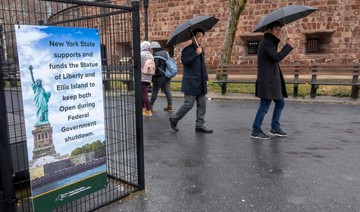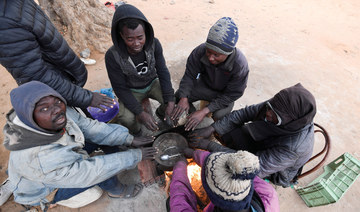WASHINGTON: With no breakthrough in sight, President Donald Trump will argue his case to the nation Tuesday night that a “crisis” at the US-Mexico border requires the long and invulnerable wall he’s demanding before ending the partial government shutdown. Hundreds of thousands of federal workers face missed paychecks Friday as the shutdown drags through a third week.
Trump’s Oval Office speech — his first as president — will be followed by his visit Thursday to the southern border to highlight his demand for a barrier. White House press secretary Sarah Huckabee Sanders tweeted that he will use the visit to “meet with those on the front lines of the national security and humanitarian crisis.”
The administration is also at least talking about the idea of declaring a national emergency to allow Trump to move forward on the wall without Congress approving the $5.6 billion he wants. Vice President Mike Pence said the White House counsel’s office is looking at the idea. Such a move would certainly draw legal challenges, and Trump — who told lawmakers he would be willing to keep the government closed for months or ever years — has said he would like to continue negotiations for now.
Trump’s prime-time address will be carried live by ABC, CBS, CNN, Fox Broadcasting, Fox News Channel, Fox Business Network, MSNBC and NBC.
As Trump’s speech and border visit were announced, newly empowered House Democrats — and at least a few Republican senators — stepped up pressure on GOP lawmakers to reopen the government without giving in to the president’s demands The closure, which has lasted 17 days, is already the second-longest in history and would become the longest this weekend.
Leaning on Senate Republicans, some of whom are growing anxious about the impact of the shutdown, House Speaker Nancy Pelosi said the House would begin passing individual bills this week that would reopen federal agencies, starting with the Treasury Department to ensure Americans receive their tax refunds .
The White House moved to pre-empt the Democrats, telling reporters Monday that tax refunds would be paid despite the shutdown. That shutdown exemption would break from the practice of earlier administrations and could be challenged.
“There is an indefinite appropriation to pay tax refunds. As a result ... the refunds will go out as normal,” said Russell Vought, acting director of the White House budget office.
There were other signs that administration was working to control the damage from the shutdown, which has furloughed 380,000 federal workers and forced another 420,000 to work without pay. The National Park Service said it was dipping into entrance fees to pay for staffing at some highly visited parks to maintain restrooms, clean up trash and patrol the grounds, after reports of human waste and garbage overflowing in some spots.
Over the weekend, the federal agency tasked with guaranteeing US airport security acknowledged an increase in the number of its employees missing work or calling in sick.
But Trump and the Transportation Security Administration pushed back on any suggestion that the call-outs at the agency represented a “sickout” that was having a significant effect on US air travel. TSA said it screened more than 2.2 million passengers Sunday, a historically busy day due to holiday travel. Ninety percent waited less than 15 minutes, the agency said.
“We are grateful to the more than 51,000 agents across the country who remain focused on the mission and are respectful to the traveling public,” said TSA spokesman Michael Bilello.
The talks over ending the shutdown have been at an impasse over Trump’s demand for the wall. He has offered to build the barrier with steel rather than concrete, billing that as a concession to Democrats’ objections. They “don’t like concrete, so we’ll give them steel,” he said.
But Democrats have made clear that they object to the wall itself, not how it’s constructed. They see it as immoral and ineffective and prefer other types of border security funded at already agreed-upon levels.
“Maybe he thinks he can bully us. But I’m from Brooklyn. You let a bully succeed, you’ll be bullied again worse,” Senate Minority Leader Charles Schumer said at a breakfast with the Association for a Better New York.
At the White House, spokeswoman Mercedes Schlapp complained that Democratic leaders have yet to define what they mean when they say they are for enhancing border security.
“Democrats want to secure the border? Great. Come to the table,” she said Monday. “We are willing to come to a deal to reopen the government.”
Trump has tasked Pence during the shutdown fight to negotiate with Democrats, including during talks over the weekend with Democratic staffers. But the vice president is increasingly being called upon to prevent defections in the GOP ranks.
Asked whether cracks were forming between the White House and Republicans eager for the shutdown to end, Pence told reporters, “We’ve been in touch with those members and others.”
He said that he and Homeland Security Secretary Kirstjen Nielsen would be at the Capitol Tuesday and Wednesday to brief lawmakers.
Among the Republicans expressing concern was Sen. Susan Collins, R-Maine, who said Senate Majority Leader Mitch McConnell should take up funding bills from the Democratic-led House.
“Let’s get those reopened while the negotiations continue,” Collins said Sunday on NBC’s “Meet the Press.”
However, McConnell has said he won’t take up funding bills without Trump’s support.
Adding to concerns of lawmakers, federal workers who are still on the job apparently will miss this week’s paychecks. Acting chief of staff Mick Mulvaney said on NBC’s “Meet the Press” that if the shutdown continues into Tuesday, “then payroll will not go out as originally planned on Friday night.”
Trump asserted that he could relate to the plight of the federal workers who aren’t getting paid, though he acknowledged they will have to “make adjustments” to deal with the shutdown shortfall.
Not so easy, many of them say.
Derrick Padilla, a corrections officer with the Federal Bureau of Prisons in Colorado, has worked without pay for two weeks and said he’s nearly depleted his savings.
“It’s now becoming a game of, ‘OK, who’s going to get paid? How am I going to make this payment? What’s the most important thing I have to pay for this month?’” he said.
“The bills don’t go away,” Padilla added. “We’re expected to meet our financial obligations, and we’re being put in a position to not be able to meet those obligations.”
For furloughed federal workers in Washington, some at least could enjoy the prospect of baseball in a few months. The Washington Nationals said season ticket holders who are laid off or not being paid by the federal government could postpone monthly ticket payments until the government is back up and running.
Trump heads to TV, border as fed workers face paycheck sting
Trump heads to TV, border as fed workers face paycheck sting
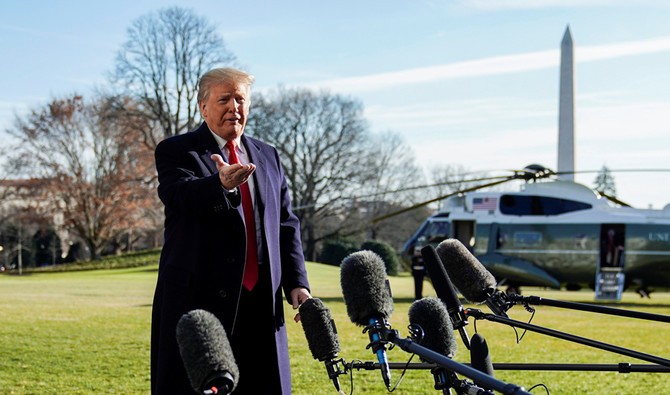
- Trump will visit the southern border on Thursday to highlight his demand for a barrier
- Hundreds of thousands of federal workers face missed paychecks Friday as the shutdown drags through a third week
Tunisia recovers bodies of four migrants off its coast, rescues dozens

- Tunisia has replaced Libya as the main departure point for people fleeing poverty and conflict in Africa and the Middle East
TUNIS: Tunisia recovered the bodies of four migrants off the country’s coast on Saturday, the national guard said, amid an increase in migrant boats heading from Tunisia toward Italy in recent weeks.
The force said the coast guard separately rescued 52 migrants. The national guard arrested nine smugglers, and boats were seized.
At least 23 Tunisian migrants were missing after setting off in a boat for Italy, the national guard said earlier on Saturday.
Tunisia is facing a migration crisis and has replaced Libya as the main departure point for people fleeing poverty and conflict in Africa and the Middle East in the hope of a better life in Europe.
New Caledonia ‘under siege’ as French troops bid to restore order

- The unrest has been blamed on economic malaise, social tensions and — above all — a political fight between mostly Indigenous pro-independence activists and Paris authorities
- New Caledonia has been a French territory since the mid-1800s
NOUMEA, New Caledonia: French Pacific territory New Caledonia was “under siege” Saturday, the mayor of its capital Noumea said, after another person was killed, bringing the toll to six in six days of unrest.
Two other men were wounded in Saturday’s deadly incident, which occurred in the archipelago’s northern Kaala-Gomen area, General Nicolas Mattheos said.
Hundreds of heavily armed French soldiers and police patrolled the debris-filled streets of Noumea Saturday.
But Philippe Blaise, vice president of the territory’s southern province, said: “Today, the rule of law, security for citizens, are not back in place everywhere in (New) Caledonia.”
And Noumea mayor Sonia Lagarde told news channel BFMTV: “We’re far from getting back to calm.”
Anger is still high over a contested voting reform, even after the arrival of hundreds of military and police reinforcements.
AFP reporters in the city’s Magenta district saw vehicles and buildings torched, with riot police on the scene trying to reassert control.
Overnight, residents reported hearing gunfire, helicopters and “massive explosions” — seemingly gas canisters blowing up inside a burning building.
For days, Helene, 42, has been guarding makeshift barricades in shifts with neighbors as they waited for hundreds of French security forces to be flown in to restore order.
“At night we hear shooting and things going off,” she told AFP. “Helicopters and military planes landing — which is sweet music to our ears.”
Economic malaise
For almost a week, the usually calm oceanside city has been convulsed with violence.
Two gendarmes and three other people, Indigenous Kanaks, have also been killed.
The unrest has been blamed on economic malaise, social tensions and — above all — a political fight between mostly Indigenous pro-independence activists and Paris authorities.
French officials have accused a separatist group known as the CCAT of being behind the riots and have placed 10 of its activists under house arrest.
CCAT on Friday called for “a time of calm to break the spiral of violence.”
Annie, an 81-year-old Noumea resident, said the week’s violence had been worse than that seen during the tumultuous 1980s: a time of political killings and hostage-taking referred to as “The Events.”
“At the time, there weren’t as many weapons,” she said.
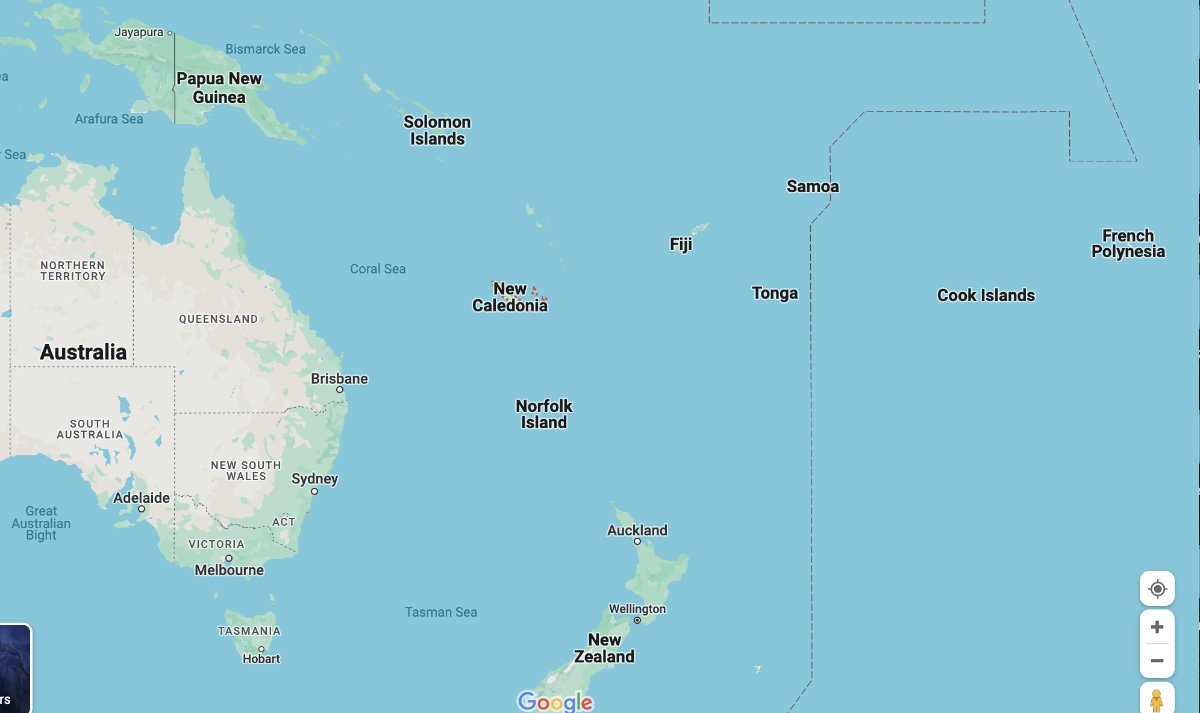
Seeking independence
New Caledonia has been a French territory since the mid-1800s.
Almost two centuries on, its politics remains dominated by debate about whether the islands should be part of France, autonomous or independent — with opinions split roughly along ethnic lines.
The latest cycle of violence was sparked by plans in Paris to impose new voting rules that could give tens of thousands of non-Indigenous residents voting rights.
Pro-independence groups say that would dilute the vote of Indigenous Kanaks, who make up about 40 percent of the population.
French authorities have called for talks and insist the situation is now “calmer” and being brought under control.
Around 1,000 security forces began reinforcing the 1,700 officers on the ground from Thursday.
Efforts to negotiate peace have so far stumbled, although French President Emmanuel Macron had begun contacting pro- and anti-independence officials individually on Friday, his office said.
'Azerbaijani actors'
A local business group estimated the damage, concentrated around Noumea, at 200 million euros ($217 million).
The damage to the islands’ reputation may cost even more.
Tourism is a big earner for New Caledonia, but an estimated 3,200 tourists and other travelers have been stranded inside or outside the archipelago by the closure of Noumea’s international airport.
The unrest has also pushed organizers to cancel plans to bring the Olympic flame through New Caledonia on its journey from Athens to Paris — where the summer Games will begin in late July.
“I think everyone understands, given the current context, the priority is consolidating a return to public order and then appeasement,” French Sports Minister Amelie Oudea-Castera said on Saturday.
On Friday, French government agency Viginum said it detected a “massive and coordinated” online campaign pushing claims that French police had shot pro-independence demonstrators in New Caledonia.
Paris pointed to the involvement of “Azerbaijani actors” in the campaign, deepening a diplomatic spat between the two countries.
Azerbaijan has denied accusations of interference in New Caledonia.
1m march in London to mark 76 years of Nakba

- 2-km march led by Gazan photojournalist Motaz Azaiza
LONDON: About 1 million people peacefully marched in London on Saturday to commemorate the 76th anniversary of the Nakba (Catastrophe), which saw the expulsion of nearly 800,000 Palestinians from their homeland when Israel was established in 1948.
Regular Saturday marches in London since the Gaza war began last October have drawn hundreds of thousands of participants.
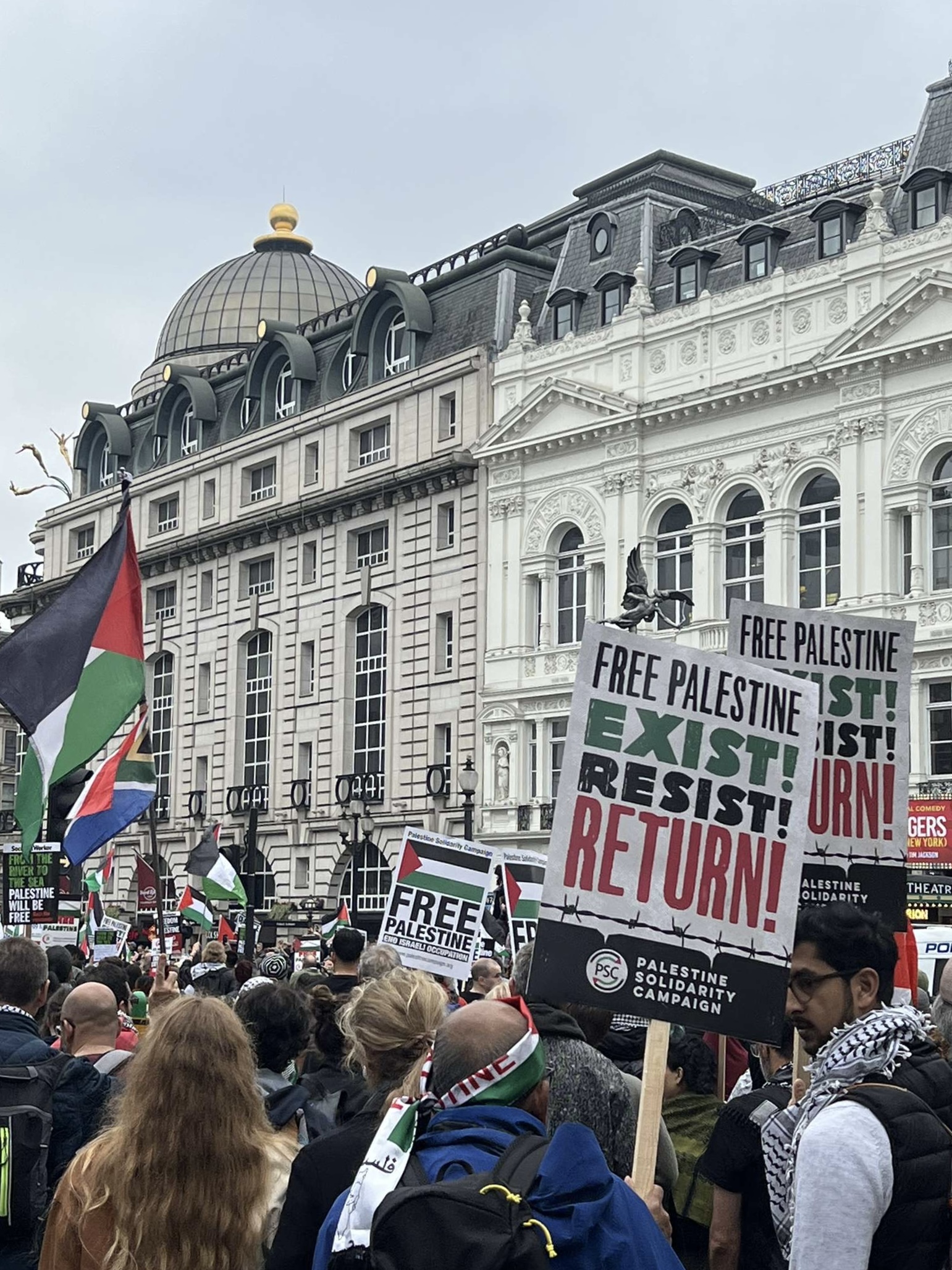
Crowds gathered at the BBC headquarters for a 2-km march led by Palestinian photojournalist Motaz Azaiza and a group of young British Palestinians carrying large lock keys, which symbolize their inalienable right to return to their homes under international law.
Azaiza’s Instagram following has surged to over 18 million as he documented the daily realities of Israel’s invasion and relentless bombardment of Gaza.
Since January, the 24-year-old has been traveling worldwide to advocate for a ceasefire and an end to the Israeli occupation.
“I didn’t believe that I’d stay alive to stand today here in London in front of the people. You saw me there under the bombing,” he told the crowd.
“You made me hope that there was hope. I didn’t believe in anyone, but … today, the moment I saw you all I thought there’s hope. The hope is in the people, not in the governments.”
Several pro-Palestinian organizations across the UK organized the march, calling on the British government to halt arms exports to Israel and restore funding to the UN Relief and Works Agency for Palestine Refugees in the Near East.
“Today, we reflect on the reality that this Nakba couldn’t be sustained by Israel without the enduring complicity of Western powers, including successive UK governments,” said Ben Jamal, director of the Palestine Solidarity Campaign.
“Today, even in this darkest moment, we also march to celebrate and affirm the refusal of the Palestinian people to succumb to erasure. We won’t stop, we won’t rest, until the Palestinian people finally achieve their liberation.”
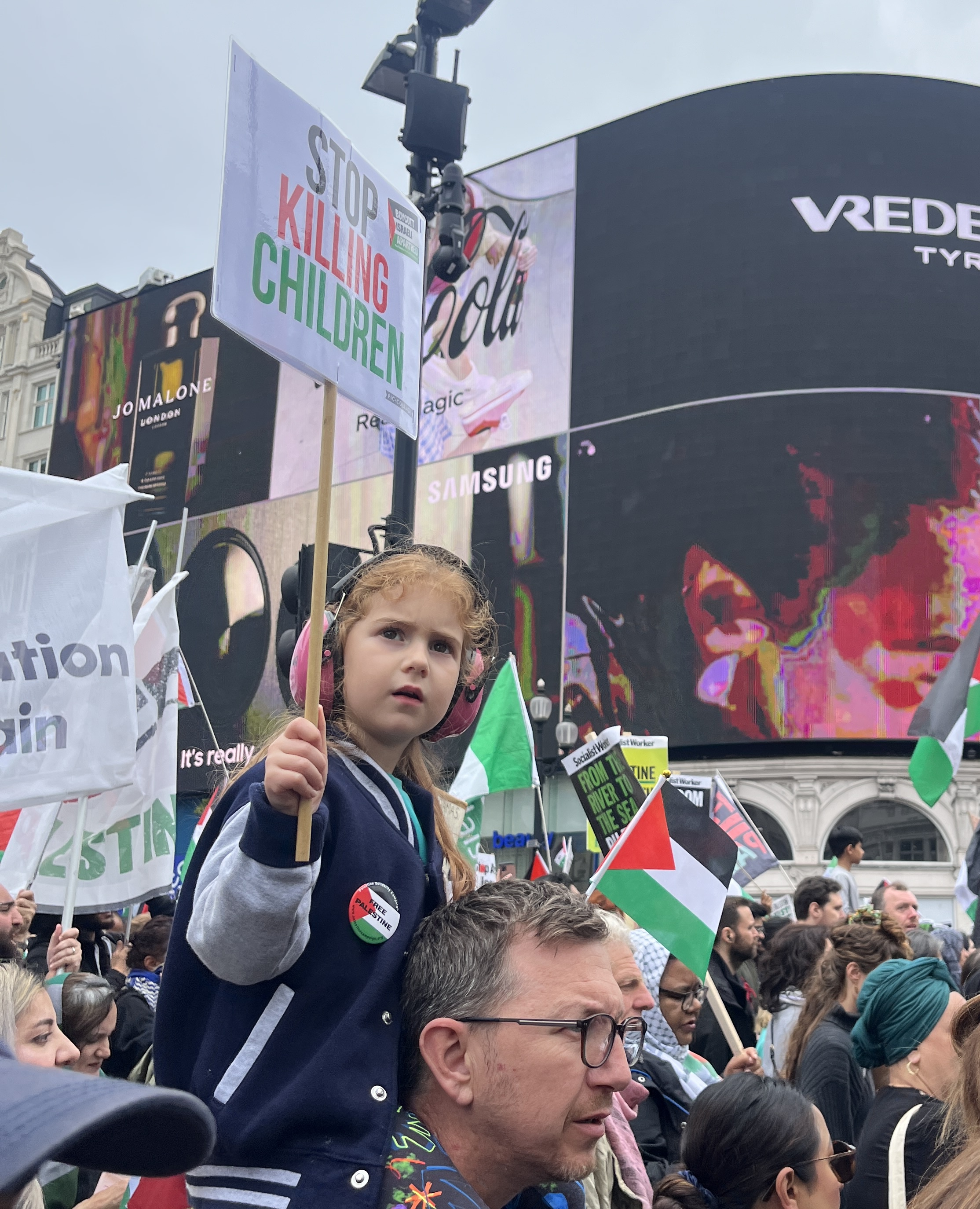
The rally was met with a much smaller counter-protest carrying Israeli flags. There were only eight arrests reported by the London Metropolitan Police.
Parts of northern India scorched by extreme heat with New Delhi on high alert

NEW DELHI: Parts of northwest India sweltered under scorching temperatures on Saturday, with the capital New Delhi under a severe weather alert as extreme temperatures strike parts of the country.
India’s weather department expects heat wave conditions to persist across the north for the next few days, and has put several states on high alert. On Friday, parts of New Delhi reported up to 47.1 degrees Celsius. The nearby states of Punjab, Haryana and Rajasthan also saw temperatures soar and are likely to stay high over the next few days, said Soma Sen Roy, a scientist at the India Meteorological Department.
Roy cautioned people against going outdoors under the afternoon sun, drink lots of water and wear loose-fitting clothes while those who are especially vulnerable like the elderly should stay indoors.
The extreme temperatures in northern India coincide with a six-week-long general election, with experts worried that the heat wave could increase health risks as people wait in long lines to cast their vote or candidates campaign aggressively in the outdoors. One minister fainted due to heat last month while addressing an election rally in Maharashtra state.
Satish Kumar, a 57-year-old rickshaw driver in the capital, said his work was suffering because of the heat. “People are not coming outside, (markets) are nearly empty,” he said.
Pravin Kamath, a 28-year-old who runs a cart selling cold drinks, complained that it was so hot he could hardly stand being outdoors. “But I must work. What can I do? I am poor so I have to do it.”
The main summer months — April, May and June — are always hot in most parts of India before monsoon rains bring cooler temperatures. But the heat has become more intense in the past decade and is usually accompanied by severe water shortages, with tens of millions of India’s 1.4 billion people lacking running water.
A study by World Weather Attribution, an academic group that examines the source of extreme heat, found that a searing heat wave in April that struck parts of Asia was made at least 45 times more likely in some parts of the continent by climate change.
Asian activists call out Western feminists over ‘selective empathy’ on Gaza

- Non-Western feminists say white supremacy, imperialism are inherent to Western feminism
- Seven months into Israel’s deadly war on Gaza, feminists in the West have been largely silent
JAKARTA: When Western actresses and female politicians cut their hair to protest the death of Mahsa Amini or rallied against the Taliban ban on girls’ education, they stood up to defend women’s rights. However, the zeal went missing when it came to Palestine, non-Western feminists say, denouncing their peers’ silence on Israel’s killing of women in Gaza.
Mass protests and displays of solidarity in Europe and the US broke out in 2022 and carried on into 2023 following the death in Iranian police custody of the 22-year-old Amini, who was charged with breaching hijab rules. In the same years, when the Taliban barred Afghan girls from school, women united in outcry and called for international pressure against them.
But more than seven months into Israel’s indiscriminate killing, wounding, and maiming of Palestinian civilians, the West’s mainstream feminist movement has been largely silent.
At least 35,800 people in Gaza have been killed and 80,000 wounded by Israeli airstrikes and ground offensive that have destroyed most of the enclave’s infrastructure and rendered it uninhabitable.
The majority of the dead are women and children. Many have lost their lives as most of the hospitals have been flattened by Israeli troops and no medical assistance could reach them.
The International Rescue Committee estimated last month that 37 mothers had been killed in Gaza each day and 60,000 pregnant women had no access to midwives or doctors, while tens of thousands struggled with breastfeeding as they were so malnourished due to Israel’s blockade of humanitarian aid.
In the face of the widely documented atrocities, Haein Shim, Korean activist and spokesperson of Haeil, a Seoul-based feminist group, told Arab News that Western feminists were exhibiting “selective empathy” and “double standards” with regard to Israel’s onslaught, the criticism of which has regularly been labeled as “antisemitism” — not only by Israeli authorities but by Western leaders as well.
“I strongly believe these issues are interconnected with racism, imperialism, and colonialism,” Shim said.
“We need to urge each other to break the silence and unite against occupation and subjugation, Israel’s human rights abuses and ongoing genocide. One thing to be clear: Our solidarity does not mean antisemitism but only to end the vicious genocide and violence against women and children.”
While Shim believes it is not too late for “global feminist solidarity” with women in Gaza, Fadiah Nadwa Fikri, Malaysian human rights lawyer and scholar focused on decolonization, sees an intrinsic flaw in Western feminism, which might prevent it.
“The function of Western feminism, which is inherently imperialist, is to reduce and dehumanize not only Palestinian women and children but also Palestinian men, who have been subjected to decades of Israeli settler colonialism, with the full support of US imperialism and its allies in Europe,” she said.
“It is, therefore, not surprising to witness the deafening silence of most Western feminists, who are staunch advocates of this strand of feminism, in the face of relentless imperialist violence in Gaza and all of historical Palestine. Their silence is an endorsement of the status quo.”
For Fikri, Western feminism has been shaped by “the racist narrative of the clash of civilizations,” and its silence on Gaza was merely consequential.
“We see women like Madeline Albright, Condoleezza Rice, Hilary Clinton, Kamala Harris — both white and non-white — who depict themselves as champions of women’s rights become members of the ruling classes of imperialist states that are responsible for the mass death, destruction, and suffering around the world,” she said.
“Therefore, there are no double standards of Western feminism; there is only one political standard meant to protect the interests of the imperialist ruling classes, which has been applied consistently.”
In the context of Israel and accusations of antisemitism fired against its critics, Asian feminists also cited the problem of white supremacy, which they closely linked with Zionism.
“Zionist ideologies are not just harming and discriminating against Palestinians, and the destruction of Palestine is not merely about Palestine. Zionism is about white supremacy and colonization, and the destruction of Palestine is just another example of imperialist violence inflicted by Western colonizers, aka white people,” said V., member of Chinese Feminism in Toronto, a Canada-based grassroots collective, who requested to remain anonymous.
“If we consider the sociopolitical context of North America, we know most Jews are also white people, yet we do not have the space to discuss the complexity of antisemitism and white supremacy simultaneously. I guess that speaks a lot (as to) why white feminists tend to be hypocritical here.”
Her colleague, G., also a member of the group, said that hypocrisy was also present among non-white women leaders who were “internalizing whiteness” and embracing Zionism.
“We need to understand this should not be done in our names. We need to have firm voices and expose these leaders as Zionist agents and complicit in genocide, instead of accepting the fact that our elected leaders turn complicit and no longer represent us. We need to hold them accountable,” she said.
“Decolonization is not just theory. We all need to move beyond the bystander observer position and let Palestine radicalize us. We need to continue to educate ourselves and our communities on colonial feminism/pinkwashing and purplewashing.”
Part of the struggle is debunking pro-Israel propaganda and fighting “against the utilization of antisemitism to shut down any criticism against Israeli or Zionist policies,” according to Okky Madasari, Indonesian novelist and academic, whose research focuses on knowledge production and censorship.
“There must be a unified campaign to stop believing anything coming out from the Israeli authorities. They are liars unless they are proven otherwise,” she told Arab News.
For those activists who for the past seven months have been silent over Gaza, Okky suggested that they stop using the feminism label altogether.
“You should be ashamed of yourself if you don’t speak up against Israel when you are so fussy about many other more trivial things,” she said.
“Condemning Israel and taking sides with the Palestinians is what any decent human being must do, let alone if you are a feminist.”



